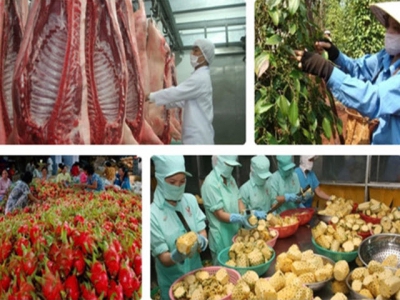New-generation FTAs pin hopes on future agricultural growth

Both the CPTPP and EVFTA trade pacts, expected to come into effect this year, are set to increase the access that Vietnamese farm produce enjoy in demanding overseas markets.
New generation FTAs, along with their advantages, are set to bring in new challenges to the agricultural sector.
Imminent golden chances
The agricultural sector is set to achieve an annual growth rate of at least 2.9 per cent during 2019, with export turnover amounting to between US$42 to 43 billion.
With trade agreements already signed and about to come into force, many local businesses and farmers are standing on the threshold of making a fortune.
Of note, aquatic exports such as cod, surimi, shrimp and crab to Canada and Japan will be immune from tariffs once the Comprehensive and Progressive Agreement for Trans - Pacific Partnership (CPTPP) takes effect.
Tra and basa fish (catfish), major export staples to Mexico, will enjoy a tax rate of 0 per cent in the third year after the trade pact comes into effect. Rice exports will also be immune from tariffs immediately after the CPTPP comes into effect, thus enabling local rice firms to increase its market share in Canada and Mexico.
Meanwhile, when the EU-Vietnam Free Trade Agreement (EVFTA) comes into effect, a number of Vietnamese products such as peppers, currently at 0 to 11 per cent tariffs, will enjoy tax reductions down to between 0 to 4 per cent.
As for fruit and vegetables, the EU basically committed to eliminating tariffs on such farm produce immediately after the EVFTA takes effect. Additionally, about 50 per cent of the tariffs levied on aquatic products are to be removed, with the remaining tariffs set to be abolished in a three to seven year process.
Other key exports, namely timber, wooden items, and aquatic products are planned to enjoy benefits from preferential tariffs prescribed in the new generation FTAs.
These new FTAs are likely to make Canada, Australia and others potential markets for Vietnamese farm produce. Tran Tuan Anh, Minister of Industry and Trade, stressed that 2019 is the year which will witness a new trading period for Vietnam. With new generation FTAs imminent, the Government's upcoming action program needs to lay out a new stage for the development of the agricultural sector.
Anh went on to say that in 2019, efforts should be raised to overcome current limitations, especially market expansion, with a view to lifting agricultural exports to between US$42 to 43 billion.
Focus needs to be put on further restructuring the production in the domestic agricultural sector, improving the quality of products, making full use of preferential mechanisms, and overcoming technical barriers so that these elements can leverage the access Vietnamese farm produce enjoy to CPTPP and EVFTA member countries, the minister added.
Eyeing smart agricultural production
According to Nguyen Xuan Cuong, Minister of Agriculture and Rural Development, the new generation FTAs, along with their advantages, are set to bring in new challenges to the agricultural sector.
“Consumption and sales will get more volatile and riskier as the capacity of domestic management as well as supply and demand forecasts pose inadequacies.
The rescue of pork meats has been a painful lesson while the ‘yellow card’ warning issued by the European Commission to Vietnam over its fisheries exploitation has yet to be lifted," Cuong analyzed.
Minister Cuong has high hopes on the feasibility of bringing the export turnover to between US$42 to 43 billion, but he elaborated that non-stop efforts must be continued to foster agricultural restructuring geared at higher production efficiency and expanded deep-processing industry.
Dr. Vo Tri Thanh, head of the Institute of Strategy and Competition, said that the quality of agricultural products will be of significance in making them more competitive in overseas markets once the FTAs become effective.
The added value and profits local businesses and farmers could gain from farm produce must also act as catalysts for growth, not simply the target of US$42 to 43 billion in export turnover, Thanh claimed.
Có thể bạn quan tâm
 Mekong Delta farmers embrace new technology
Mekong Delta farmers embrace new technology Cửu Long (Mekong) Delta provinces are making efforts to develop digital farming, enabling farmers to use technologies to take care of their farms remotely.
 Livestock sector focuses on exports
Livestock sector focuses on exports The Department of Livestock Husbandry has said intensive efforts would be made to boost exports of animal products this year.
 Viet Nam to face difficulties in cassava exports
Viet Nam to face difficulties in cassava exports Việt Nam will continue to face difficulties in exporting cassava this year, especially to China, the largest export market of local cassava